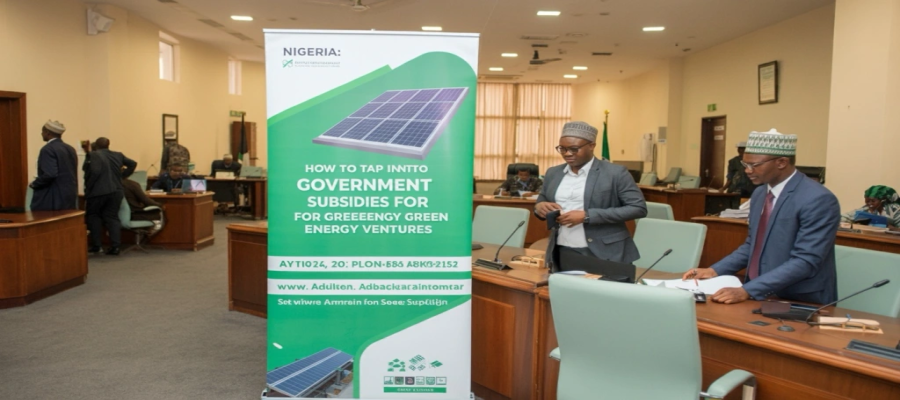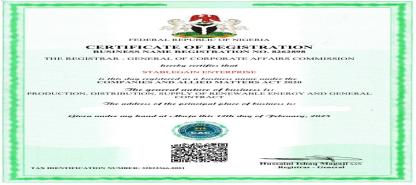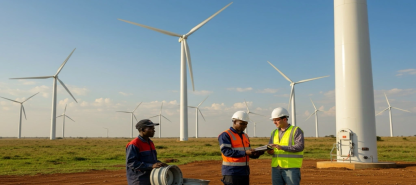
- 17 Feb 2025
Nigeria: How to Tap into Government Subsidies for Green Energy Ventures
As the global transition toward renewable energy accelerates, Nigeria is positioning itself as a key player in the green energy space. To encourage this transition, the Nigerian government has introduced several subsidies and incentives aimed at supporting entrepreneurs and businesses investing in green energy ventures. But how can you, as an entrepreneur, effectively access these opportunities? Here’s your ultimate guide to tapping into government subsidies for green energy ventures in Nigeria.
1. Understand the Policy Framework
The Nigerian government has adopted various policies to drive its renewable energy agenda, such as the National Renewable Energy and Energy Efficiency Policy (NREEEP). These policies outline the government’s commitment to achieving energy access, sustainability, and affordability. Understanding these frameworks is the first step to identifying the programs that align with your business goals.
Key Takeaway: Stay updated with energy policies published by the Ministry of Power and the Rural Electrification Agency (REA).
2. Explore Available Subsidy Programs
A. The Green Energy Incentive Scheme
The government provides direct subsidies and financial support to green energy projects under this scheme. This initiative supports solar farms, biomass projects, and wind energy installations.
B. The Nigeria Electrification Project (NEP)
Administered by the REA, this project focuses on scaling up renewable energy solutions, particularly in off-grid areas. Subsidies are available for solar home systems, mini-grids, and other renewable energy technologies.
C. Tax Incentives
Through the Pioneer Status Incentive (PSI) program, green energy businesses can benefit from:
- Corporate tax holidays (up to 5 years).
- Accelerated capital allowances for renewable energy equipment.
Additionally, under the Finance Act, renewable energy technologies like solar panels and inverters are exempt from VAT, significantly reducing import costs.
3. Collaborate with International Partners
Organizations such as the World Bank, USAID, and African Development Bank (AfDB) partner with the Nigerian government to fund green energy ventures. Programs like the Solar Power Naija Initiative, part of Nigeria’s Economic Sustainability Plan (ESP), aim to finance renewable energy projects for millions of households.
Pro Tip: Look for co-funding opportunities and technical assistance programs offered by international agencies.
4. Meet Eligibility Requirements
To access these subsidies, you’ll need to meet specific criteria:
- Register your business with the Corporate Affairs Commission (CAC).
- Provide a clear business plan demonstrating your green energy project’s impact on energy access and job creation.
- Ensure compliance with environmental and energy regulations.
5. Steps to Apply for Subsidies
Step 1: Identify the Right Program
Visit the websites of relevant agencies like the REA or Nigerian Investment Promotion Commission (NIPC) to find programs suitable for your venture.
Step 2: Prepare a Comprehensive Proposal
Your proposal should include:
- A project summary.
- Financial projections.
- Environmental impact assessments.
Step 3: Submit Your Application
Applications can typically be submitted online through agency portals. Be sure to follow up regularly and respond promptly to requests for additional information.
6. Challenges to Watch Out For
Accessing government subsidies can be complex due to:
- Lengthy approval processes.
- Limited awareness of available programs.
- Bureaucratic red tape.
To overcome these, consider hiring a consultant or collaborating with industry associations like the Renewable Energy Association of Nigeria (REAN).
7. Success Stories to Inspire You
Entrepreneurs like Damilola Ogunbiyi, former head of the REA, have spearheaded renewable energy projects that have transformed lives in rural communities. Similarly, startups like Arnergy Solar and Rubitec Solar have tapped into government subsidies to scale their operations and make renewable energy accessible.
8. The Future of Green Energy in Nigeria
With increasing government and private sector involvement, Nigeria’s renewable energy sector is poised for exponential growth. Entrepreneurs who leverage subsidies today will play a critical role in shaping a sustainable tomorrow.
Conclusion
Tapping into government subsidies for green energy ventures in Nigeria requires strategic planning, a strong understanding of available programs, and a commitment to sustainability. By leveraging these opportunities, you can not only grow your business but also contribute to Nigeria’s green energy revolution.
The future is green—are you ready to be part of it?




